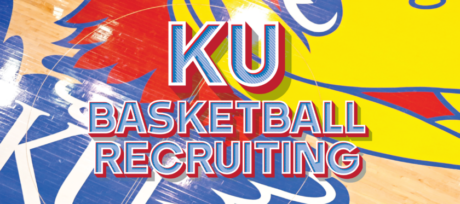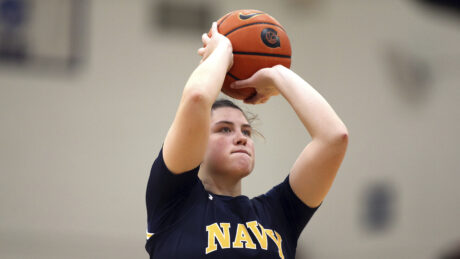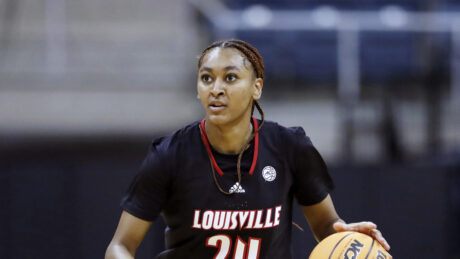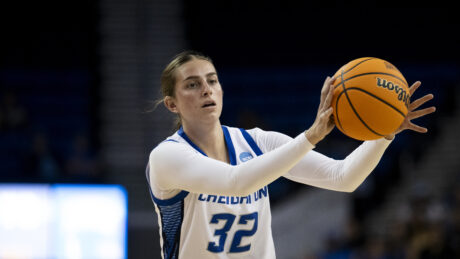The four players the Kansas women’s basketball team has added over the course of the last two transfer cycles have something in common: They are all from Kansas.
This year’s additions so far, Sania Copeland (a Wisconsin transfer from Kansas City) and Brittany Harshaw (a Creighton transfer from Andover) hail from the Sunflower State, as did last year’s Ryan Cobbins (an Alabama transfer from Kansas City) and Skyler Gill (a North Alabama transfer from Wichita).
Every player who enters the portal has their own set of reasons for doing so and their own set of attributes they’re seeking in a future school. It’s no surprise a college basketball program would use proximity to friends and family to its advantage, but it’s certainly been an asset for the Jayhawks.
“I think that played a really big factor to be honest, to come back for (Ryan) and spend her graduate year, her final year, with friends and family being able to support her was a big part of her decision,” Schneider said at last season’s Big 12 Conference media day. “And then Skyler both wanted to move to the Power Five level and, I think, had grown up a Kansas fan during her time in Wichita.”
Guard Zakiyah Franklin added at the time that it “just lets you know that Kansas is the place to be.”
The pair of transfers ended up serving as KU’s first and second women off the bench by overall minutes, with the experienced Cobbins in particular providing some energy and versatility when she took the floor. Cobbins exhausted her eligibility after the season and Gill reentered the transfer portal (and has since committed to Florida Gulf Coast).
Kansas was in some sense the place to be last season as the Jayhawks had a veteran core with lofty aspirations — which ultimately ended up performing quite well after a challenging start to the season, and reaching the second round of the NCAA Tournament — but from a transfer’s perspective, it may even be a more appealing destination this season.
KU returns two starters in S’Mya Nichols and Wyvette Mayberry. Not only is Nichols one of the Big 12’s most promising young players, but both she and Mayberry move the ball effectively and will create numerous opportunities for teammates. In addition, KU has next to no experience coming back besides those two. Beyond the regional association, it’s easy to see the value proposition for Harshaw, a lanky scorer who wasn’t getting much playing time at Creighton, or Copeland, a strong defender with offensive upside who can team with those two guards.
The Jayhawks aren’t done, though, or at least shouldn’t be; with Nichols, Mayberry, centers Nadira Eltayeb and Danai Papadopoulou and guards Laia Conesa and McKenzie Smith coming back, plus the two transfers and freshmen Zoe Canfield, Carla Osma and Regan Williams coming in, KU still has two scholarship slots if it wishes to have the same number of scholarship players as last season. So — primarily as a thought experiment, not based on any actual evidence of interest in these players — could it seek out any remaining Kansans in the portal?
Navy guard Shannon Clarke (3) takes a shot during an NCAA basketball game against the Georgetown Hoyas on Sunday, Dec. 11, 2022, in Washington.
Louisville guard Eylia Love during an NCAA basketball game against Alabama on Friday, Nov. 24, 2023, in Katy, Texas.
Creighton guard McKayla Miller (32) catches the ball during an NCAA basketball game against UNLV, Saturday, March 23, 2024, in Los Angeles.
A sampling
These six players are all listed in the portal by The Next and WBB Blog, a pair of sites that track such things:
Shannon Clarke, 6-foot-1 guard, Navy (Lawrence)
Emari Doby, 5-foot-10 guard, Denver (Topeka)
Aubrie Kierscht, 5-foot-6 guard, Presbyterian (Salina)
Eylia Love, 6-foot-1 guard, Louisville (Kansas City)
McKayla Miller, 6-foot-1 guard, Creighton (Cimarron)
Bailey Wilborn, 5-foot-8 guard, Wyoming (Wichita)
It’s fair to assume that sparse playing time at a lower level of Division I basketball does not consequently lead to a role at Kansas, so that could knock several players off the list, including the Lawrence native Clarke (who after showing some early promise at Navy has played just three minutes since the start of the calendar year 2023), Doby (16 total minutes as a freshman at Denver) and Wilborn (a similar story to Clarke, except over three years between Maine and Wyoming).
That leaves a trio of prospects.
Kierscht is an interesting one, as she is coming off a torn ACL suffered in November of last year (as she wrote on X). But prior to that she was excellent as a freshman for Presbyterian. A former all-time leading scorer at Salina Central High School, she averaged 10.5 points over the final 20 games of her first season in college. Much of that production came from beyond the 3-point line, where she was 65-for-171 on the year, meaning she shot 38% at a high volume (she actually was worse, 22-for-64 or 34%, on 2-point shots).
In some sense she would be a poor fit for KU’s current backcourt — at times the Jayhawks were already at a size disadvantage against top teams, and adding 5-foot-6 Kiersch to players like the 5-foot-7 Copeland and Mayberry would not help in that respect. But she would provide additional shooting (along with Harshaw) to a backcourt sorely in need of it after losing Holly Kersgieter to graduation. And by the way, Presbyterian, while a mid-major, made the NCAA Tournament.
Love has a significant asset on her side: four years of power-conference experience, including most recently at a nationally prominent program in Louisville. Her best season came in the middle of her career at Georgia Tech; as a sophomore in the 2021-22 campaign, she started 31 of 32 games and was third on the team in scoring with 10.5 points per game while adding 4.8 rebounds. But after a poor start to her junior season she transferred to Louisville midway through the year.
Love flashed early in the year with 16 points on 4-for-5 shooting in 21 minutes in her second game of the season against DePaul. She continued to get a solid chunk of playing time off the bench for much of the season but didn’t get very involved on offense and finished the year averaging 3.8 points, 2.7 rebounds and about one assist and one steal per game.
She could certainly slot in well as a complementary piece and help bolster the Jayhawks’ rebounding; she also has prior ties to the team as she and Copeland both attended Olathe North High School.
Finally, there’s Miller, who has played exclusively for teams called the Bluejays between Cimarron and Creighton. Miller filled a similar role to Harshaw at Creighton as one of the final players off the bench, albeit while shooting fewer 3s and more free throws than Harshaw, and averaged 2.3 points per game. Head coach Jim Flanery considered her a “hybrid” player who could both play in the post and “face up to pass or score and can shoot the three as well,” per a press release when the Bluejays signed her.
What probably makes her a less feasible acquisition, at least based on the premise of local recruiting, is that KU certainly would have less of a proximity advantage with her. Cimarron is located in the southwestern portion of the state, about five hours from Allen Fieldhouse; KU is really not that much closer than Creighton was.
The unfortunate reality of this group of Kansans is that it does not include anyone to fill what stands out as KU’s greatest remaining need, which is a center. Guards with size would be useful too, but ideally to play alongside a rim protector and inside scorer (especially when those guards are best suited to play as 3-point shooters).
The Jayhawks are unlikely to find another Taiyanna Jackson-caliber player by scavenging in the portal, but with Eltayeb coming off an Achilles injury and Papadopoulou a minimal threat on offense, they need to seek a reliable and experienced option at the position. They just may have to go outside their home state to do so.
This story has been updated to clarify that KU can offer two more scholarships if it wishes to have the same number of scholarship players as last season (13). The maximum for NCAA women’s basketball is 15.

 Mike Gunnoe/Special to the Journal-World
Mike Gunnoe/Special to the Journal-World
 AP Photo/Daniel Kucin Jr.
AP Photo/Daniel Kucin Jr. AP Photo/Michael Wyke
AP Photo/Michael Wyke AP Photo/Kyusung Gong
AP Photo/Kyusung Gong